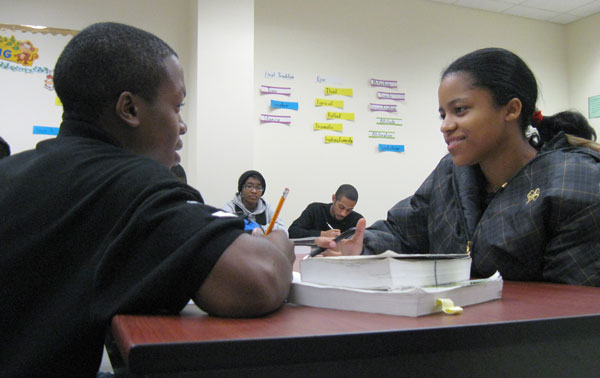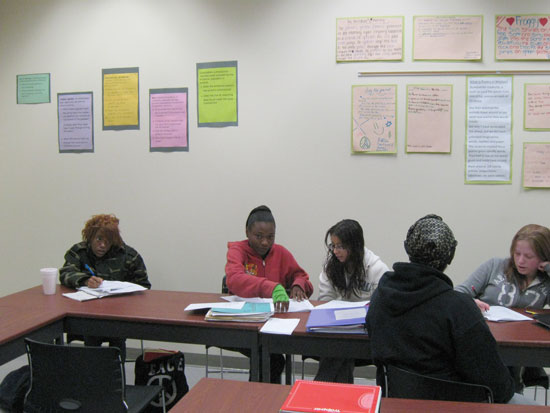By Natasha Duarte
UNC Co-editor
The Durham VOICE
thedurhamvoice@gmail.com
Two years ago, Christina Cooper was living by herself and working at McDonalds at 18.

Eddie Purdie and Charquan Rogers collaborate on an English assignment. Both students dropped out of high school and are earning high school diplomas through Durham Tech’s Gateway to College. (Staff photo by Natasha Duarte)
“I was still trying to go to school, still trying to work, and having my own place at the same time,” Cooper says.
So she dropped out of school.
“I felt like I was going nowhere,” she says.
It’s a familiar story. But Cooper and about 40 other high school dropouts hope that for them, it will have a new ending.
A few months ago, Cooper received a letter from Durham Technical Community College’s Gateway to College, a program where high school dropouts can earn a high school diploma and credits toward a college degree in one to three years.
“I felt like it was something for me to get more ahead of where I was,” Cooper says.
The 20-year-old enrolled in the program’s first cohort in August, and she’s now on her way to earning not only a high school diploma but also an associate degree in nursing.
The high school experience in a college setting
In 2009, Durham Tech received a grant from the Gateway to College National Network, which has programs in 26 other schools, says Brendon Comer, director of Gateway to College at Durham Tech.
Students age 16-21 who are admitted to the program receive a scholarship which pays for tuition, books, transportation, lunch and other student support services, Comer says.

Asia Ezell works on a poetry assignment for her Gateway to College English class. (Staff photo by Natasha Duarte)
Participants are full-time Durham Tech students and have access to all campus resources, including tutoring, counseling, library and student organizations.
Gateway to College Resource Specialist Tarica Rawlinson used to work in Durham Public Schools.
She says one main difference between Gateway to College and a traditional high school setting is access to counseling and advising.
Rawlinson has 24 students who are required to meet with her once per week, but she says she sees them much more often.
“We probably see the students five days a week,” she says.
18-year-old Charquan Rogers says Rawlinson has helped her manage the stress of trying to keep up with a challenging curriculum and maintain good grades.
After dropping out of school two years ago, Rogers says she found out about the program from her grandmother.
“I realized that without a high school diploma, I can’t make it nowhere in life,” Rogers says. “And I really want to be a successful woman.”
Rogers says she wants to attend N.C. Central University and pursue a law degree after she graduates from the program.
Gateway to College offers students a degree transfer program, Rawlinson says. Students can earn prerequisite credits and transfer to a four-year college.
A second chance
Students interested in Gateway to College must attend an info session and demonstrate at least an eighth grade reading level.
Candidates who qualify are invited back for more diagnostic tests and interviews. Rawlinson says students must demonstrate a desire to overcome their challenges to earn a high school diploma and an interest in pursuing higher education.
Antonio Surratt didn’t know if he would pass his tests and be admitted to the program. But Rawlinson says she knew in the interviews that despite his quiet demeanor, Surratt had the qualities of a leader.

(L-R) Asia Ezell, Christina Cooper, Claudia Cartagena and Carla Hopper attend Durham Tech’s Gateway to College, where 16-21-year-olds who have dropped out of school can earn their high school diplomas in one to three years. (Staff photo by Natasha Duarte)
Surratt, 19, stays for hours after school to tutor other students.
“Part of me being here is worrying about my classmates,” he says.
The two classes of Gateway students – one morning and one afternoon group – spend three hours each day together in class, and the students say it feels like a family.
“We all have problems, but in the end we all pull together,” Cooper says.
She says the close-knit group of students and their teachers work together to make sure everyone succeeds.
“High school was really laid-back for me,” Cooper says. “I could either do the work or not — and still get away with getting good grades.
“Now it’s like I have to get good grades, I have to study, I have to do everything I should’ve been doing in high school.”
“This program helps you grow,” Cooper says. “It helps you be a better person because it takes people from nothing to something.”